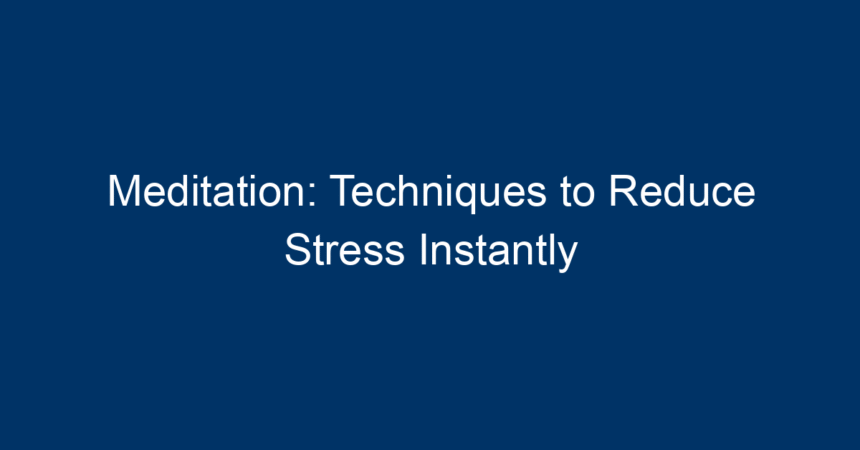In today’s fast-paced world, stress has become a common experience for many people. Whether it’s work-related pressures, personal challenges, or unexpected life changes, finding effective ways to manage stress is crucial for maintaining overall health and well-being. One of the most time-tested and scientifically supported methods for alleviating stress is meditation. This article outlines various meditation techniques that can help reduce stress instantly, allowing you to regain your peace of mind and focus.
Understanding Meditation and Its Benefits
What is Meditation?
Meditation is a practice that involves focusing the mind to achieve a state of mental clarity and emotional stability. It encompasses various techniques designed to promote relaxation, enhance concentration, and cultivate awareness. While many people associate meditation with spirituality, it is equally effective as a secular practice aimed at improving mental health and reducing stress.
The Science Behind Meditation and Stress Reduction
Studies have consistently shown that regular meditation can lower cortisol levels, the hormone commonly linked with stress. When practiced correctly, meditation encourages the brain to switch from a state of fight or flight to one of calm and relaxation. This shift not only enhances focus and memory but also contributes to better emotional regulation, creativity, and self-awareness.
Different Meditation Techniques for Instant Stress Relief
-
Mindfulness Meditation
Mindfulness meditation focuses on being fully present and aware of your thoughts, feelings, and sensations without judgment.
- How to Practice:
- Find a quiet space.
- Sit comfortably and close your eyes.
- Take a few deep breaths, allowing your body to relax.
- Bring your attention to your breath. Feel the rise and fall of your chest.
- When your mind wanders, gently bring your focus back to your breath.
-
Guided Visualization
Guided visualization uses mental imagery to create a calming experience. This technique involves imagining peaceful scenes, which can significantly reduce stress.
- How to Practice:
- Sit or lie down in a comfortable position.
- Close your eyes and take deep breaths.
- Picture a serene landscape, such as a beach or a peaceful forest.
- Engage all your senses: hear the waves, feel the breeze, and smell the flowers.
-
Body Scan Meditation
Body scan meditation encourages awareness of physical sensations throughout the body, helping to alleviate tension.
- How to Practice:
- Lie down comfortably and close your eyes.
- Start by focusing on your toes, noticing any sensations or tension.
- Slowly move your awareness up through each body part, one at a time.
- As you focus on each area, breathe deeply and release any tension you may feel.
-
Loving-Kindness Meditation (Metta)
This technique promotes feelings of compassion and love toward oneself and others, making it an ideal antidote for stress.
- How to Practice:
- Sit comfortably and close your eyes.
- Begin with yourself, repeating phrases like "May I be happy, may I be healthy, may I be safe."
- Gradually extend these wishes to loved ones, acquaintances, and even those you find difficult.
-
Breathing Techniques
Simple breathing exercises can yield immediate stress relief. Focusing on your breath not only calms the mind but also helps to regulate emotions.
- How to Practice:
- Inhale deeply through your nose for a count of four.
- Hold your breath for a count of four.
- Exhale slowly through your mouth for a count of six.
- Repeat several times until you feel calmer.
Tips for Building a Consistent Meditation Practice
Start Small
If you’re new to meditation, begin with short sessions of just five minutes a day. Gradually increase the duration as you become more comfortable with the practice.
Create a Dedicated Space
Establish a specific area in your home for meditation. A peaceful, clutter-free environment can enhance focus and relaxation.
Incorporate Meditation into Your Daily Routine
Find a consistent time each day that works for you, such as first thing in the morning or right before bed. Making meditation part of your routine will help reinforce the habit.
Use Technology Wisely
Consider using meditation apps or online resources that provide guided sessions and reminders. These tools can be especially helpful for beginners.
Be Patient
Meditation is a skill that takes time to develop. Be patient with yourself and avoid the temptation to judge your progress.
Meditation Myths Debunked
Myth 1: You Need to Empty Your Mind
Many believe that meditation requires a completely empty mind. In reality, it’s normal for thoughts to arise; the goal is to acknowledge them without attachment.
Myth 2: Meditation Takes Too Much Time
While longer sessions can be beneficial, even a few minutes of meditation can provide significant stress relief. Short sessions can make meditation more accessible in a busy lifestyle.
Myth 3: Meditation is Only for Relaxation
While meditation is excellent for relaxation, it also enhances focus, creativity, and emotional health. It can be a powerful tool for peak performance in various aspects of life.
Conclusion: Actionable Insights for Immediate Stress Relief
Incorporating meditation into your life doesn’t have to be a daunting task. Start by experimenting with different techniques to find what resonates most with you.
- Set a Goal: Aim for just five minutes of meditation daily.
- Stay Consistent: Try to mediate at the same time every day to build the habit.
- Practice Mindfulness Throughout the Day: Remind yourself to check in with your thoughts and feelings during daily activities.
Remember, the key to tapping into the benefits of meditation is persistence. By making meditation a priority, you’ll develop a powerful tool for instant stress relief that enhances your overall quality of life. So, take a deep breath, find your calm, and let meditation lead you toward a more balanced and stress-free existence.




